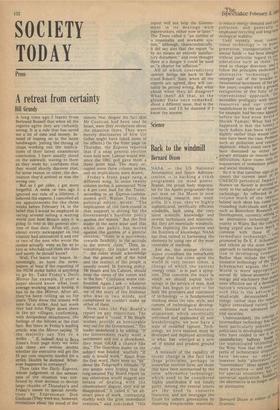SOCIETY TODAY
Press
A retreat from certainty
Bill Grundy
A long time ago I learnt from Bertrand Russell that when all the experts agree they are certainly wrong. It is a rule that has saved me a lot of time and money. Instead of leaping on to the latest bandwagon, joining the throng of chaps working out the implications of their latest unanimous conclusion, I have usually stood on the sidewalk, waving to them as they went by, confident that they would shortly discover that, for some reason or other, the destination they'd arrived at was the wrong one.
But as I get older, I get more forgetful. A week or two ago I ignored my rule of a lifetime. I believed the experts. I cancelled all my appointments for the three weeks before February 14, in the belief that I would be employed in racing around telling a waiting world just how Britain says it is going to vote in the general election of that date. After all, just about every newspaper in the country had announced it and one or two of the men who wrote the stories actually went so far as to hint at who had told them the date and surely he should know?
Well, I've learnt my lesson. Interestingly, so have the newspapers, at least if the reporting of the NUM strike ballot is anything to go by. Take Friday's Daily Mirror for example. If ever a paper should know what your average working man is feeling, it has to be the Mirror. After all, they've been telling us so for years. They know the miners will vote for a strike. And last week they had John Pilger down there in the pit villages, confirming, with Antipodean detachment, the feelings of the fellows at the coal face. But there in Friday's leading article, was the Mirror saying "If the majority say Yes to a strike..." If, indeed! And in Bryn Jones's front page story we were told there are serious doubts whether the executive will get the 55 per cent majority needed for a strike. Doubts be damned: Whatever happened to certainty?
Then take the Daily Express, whose judgement of the seriousness of the situation was confirmed by their decision to devote large chunks of Thursday's and Friday's issues to special revelations by Expressman Don Coolican.(They were not, however, revelations about the mood of the miners. Nor, despite the fact that Mr Coolican had been sent to Israel, were they revelations about the situation there. They were merely disclosures of how Uri Geller might have faked some of his effects.) On the front page on Thursday, the Express reported that if a snap general election were held now, Labour would win, since the ORC poll gave them a three point lead. The story occupied some three column inches, and no implications were drawn.
Friday's front page sang a different song. In some twenty column inches it announced 'Now a 4 per cent lead for the Tories,' according to an Express-commissioned poll. Walter Terry, the political editor, wrote: "The implication of the turn-round is that support is strong for the Government's hardline policy against the' miners." But the first leader in the same issue said that while the public has moved against the gamble of a general election, "there is a movement towards flexibility in the attitude. to the miners' claim." Then, astonishingly, the leader went on "... the rulers should acknowledge that the general will of the ruled and the instinct of the people is usually sound. In forming policy, Mr Heath and his Cabinet, should keep the views of the voters well to the fore." Confusion worse confounded. Again I ask — whatever happened to certainty? It reminds me of the story of the Irishman who was in two minds, and complained he couldn't make up either of them.
Now take the Pay Board's report on pay relativities. The Mirror said it "could, if Mr Heath wishes, provide an honourable way out for the Government." The leader underlined it by adding: "If the Government really want a settlement and not a showdown, they must GRAB a chance like this." The Guardian leader on the subject was headed wistfully "If only it would work." Apart from the first word, there were no "ifs" about the Telegraph's attitude: "If any people were hoping that the long-awaited Pay Board report on pay relativities would suggest any means of dealing with the mineworkers' dispute, they will be disappointed." It called it "an ab stract piece of work, contrasting starkly with the grim immediate realities," and concluded "this report will not help the Government in its dealings with mineworkers, either now or later." The Times called it "an outline of a reasonable and workable system," although, characteristically, it did say also that the report "is by no means an entirely satisfactory document," and even thought there is a danger it could be used as "a charter for inflation."
All of which contradictory opinion brings me back to Bertrand 'Russell. Sure, when all the experts are agreed, they will certainly be proved wrong. But what about when they all disagree? What then? Ah that, as the gloomy Dane once remarked, about a different issue, that is the question, and I'll be damned if I know the answer.


































 Previous page
Previous page